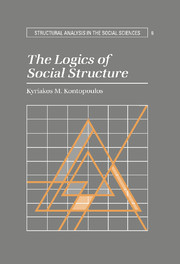Book contents
- Frontmatter
- Contents
- Preface
- Introduction
- Part I Metatheoretical considerations
- Part II Compositionist logics
- Part III Logics of hierarchy
- Part IV Heteracrchical logics
- 10 Heterarchical thinking in social thought
- 11 Neural networks as a model of structure
- Part V The phenomenology of social structures
- Appendix: The logics of structuration
- Glossary
- Bibliography
- Index
10 - Heterarchical thinking in social thought
Published online by Cambridge University Press: 24 October 2009
- Frontmatter
- Contents
- Preface
- Introduction
- Part I Metatheoretical considerations
- Part II Compositionist logics
- Part III Logics of hierarchy
- Part IV Heteracrchical logics
- 10 Heterarchical thinking in social thought
- 11 Neural networks as a model of structure
- Part V The phenomenology of social structures
- Appendix: The logics of structuration
- Glossary
- Bibliography
- Index
Summary
We have already pointed out that on the view of many theorists, the two extreme positions of methodological individualism and methodological collectivism seem fallacious and mutually implicated, functioning as the poles of an unsustainable dualism – the hallmark of “western metaphysics,” to use Derrida's term. With the post-1960s demolition of “dualism,” “objectivism,” and the metaphysical realist conception of the certainty of knowledge brought about by the onslaught of attacks from a broad postpositivist coalition (Bernstein 1983; Kuhn 1970; Lakatos 1978; Margolis 1986; Suppe 1977), the focus in social theory has shifted from the previous binary and antinomial forms to a third, synthetic position that was introduced under the banner of theories of “practice,” “the duality of structure,” the “micro-macro link,” and of “structural process” or “structuration.” These views were offered as new claims or, at least, newly-insisted-upon old claims, to the effect that “action and structure” or “agency and structure” are innermostly connected and that to see them as completely distinct has been a terrible logical mistake and a theoretical dead end.
At this, even compositionist theorists began to hedge their bets and introduced into their model of explanation “structural” (or external) variables, to indicate that the line of causation is not only from individual actions and systems of interaction to larger structures but, somehow, also the other way around.
- Type
- Chapter
- Information
- The Logics of Social Structure , pp. 211 - 242Publisher: Cambridge University PressPrint publication year: 1993



